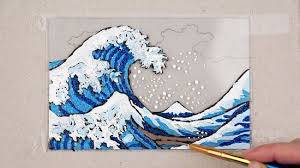Welcome to the world of Reverse Painting on Glass. This technique has been considered a popular 'art of the people' for many centuries. The use of glass as a support for this intricate painting technique has not hindered its continuing popularity.
A reverse painting is created by painting a subject onto one side of a sheet of glass (or plexiglass) after which it is viewed from the other side of the glass, or through the glass.
Contrary to painting on a canvas or similar support this technique requires an artist to paint in reverse, or 'back to front.'
When an artwork is created on a support such as canvas or wood panel, it is painted from the same angle and direction that it will ultimately be viewed from on completion. However, in the case of painting in reverse the painted side and the viewed side of the artwork are opposed to one another.
Similarly, an artwork that is created on a canvas usually begins with a rough outline and gradually builds towards its completion and finishing touches. With the use of this painting technique this procedure begins where it would normally end, and finishing touches such as finer details and the artist's signature are usually applied first and the background applications of colour are added later, hence the use of the term 'reverse painting'.
The effect that glass can give with the use of this painting technique can make it a very beautiful object. Some artists use thick glass in order to give more depth to their work.
For those who see a reverse painting on glass for the very first time it can take a little while to realise that the subject has been painted on the surface of the glass itself.
You can read more about the technique of reverse painting on glass on my Reverse Painting blog - http://www.reversepainting.blogspot.com/



No comments yet
Be the first to share your thoughts!